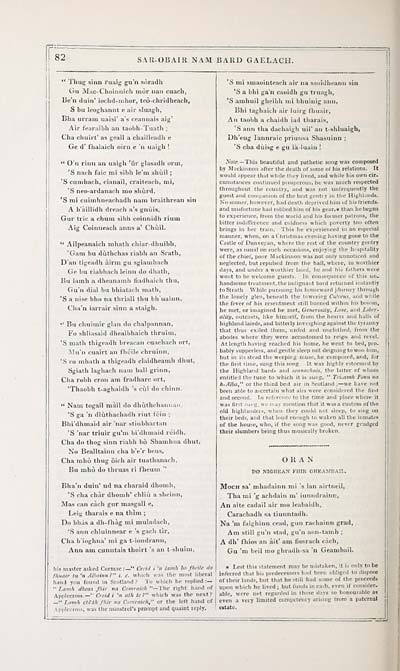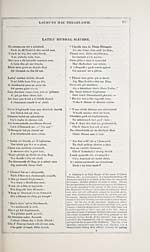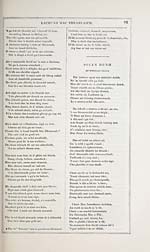Blair Collection > Sar-obair nam bard gaelach, or, The beauties of Gaelic poetry, and lives of the Highland bards
(158)
Download files
Complete book:
Individual page:
Thumbnail gallery: Grid view | List view

82
SAU-OBAllt NAM BARD GAELACH.
" Thug sinn rujiig gu'n sòradli
Gu Miic-Chdiniiich niòr nan ciiacli,
hen duiii' iochd-nihor, teò-chridheacli,
S bu Ico^haiiiit e air sluagh,
Bha urrain uaisl' a's ceannais aig'
Air iearailjh an taobh-Tuatli ;
Cha chuii't' as geall a chailleadli e
Ge d' fhalaich oirii e 'ii uaigh !
" O'ti rinii an uaigh 'ìii' glasadh orm,
'S nach faic mi sibh le'in shiiil ;
'S cmnhach, ciaiiail, craiteach, mi,
*S neo-ardanaci) mo shùrd.
'S mi cuimhneac.hadh nam braithrean sin
A b'àiHidh dreach a's gnùis,
Gur trie a chura sibh coinnidh rium
Aig Coiiiiieach anns a' Chiiil.
" Ailpeaiiaich mhath chiar-dhuibh,
'Gam bu duthchas riabh an Srath,
D'an tigeadli àirm gu sgiamhach
CSc bu riabhach leinn do dhatb,
Bu lamh a dheanamh Hadhaich thu,
Gu'ti dial bu bhiatarh math,
'S a iiise bho na thiiall tliu bh"uainn.
Cha'n iarrair sinn a staigh.
*' Bu chunnir glaii do chalpannan,
Fo shli:.said dhealbhaich thruiin,
'S math tliigeadh breaean cuachach ovt,
Mun cuairtan fhuile chruinn,
'S 10 mhath a thigeadh claidheamh dhut,
Sgiath laghach nam ball grinn,
Cha robh cron am fradharc nrt,
'Thaobh t-aghaidh 's cùl do cbinii.
« Nam togail mail do dhùthchantinn.
'S ga 'n dlùthachadh liut leiu :
Bhi'dhmaid air 'nar stiiibhartan
'S 'nar triuir gu'm bi'dhmaid icidli,
Cha do thog sinn riabh bo Shamhna dhut.
No Bealltainn cha b'e'r beus,
Cha mho thug oich air tuathanach.
Bu mho do thruas ri fheuui "
Bha'n duin' ud na charaid dhomh,
'S cha char dhomh' chliù a sht-iiin,
Mas can each gur masgall e,
Lei^' tharais e na thim ;
Do bbiis a dh-Hiag mi mulailach,
■8 anil chluinnear e 's gacli tir,
Cha bioghna' mi ga t-iondrann,
Ann am cunntais thoirt 's an t-shuim.
his master asked Cormnc :— *' CrrH i '« lamh ho fhciie do
fhnatr tu'n AUminn?'' i. e. which w;i< the most liberal
hsni you found in Scotland? To which he Tcjphed :—
" Lnrnh dheas fhir na Conimich "—1 he right h;ind nf
Applecross.— " Creid i 'n ath tef" which was the next?
— " Lnmh ehl-th fhir na Comraich," or the left hand of
Applfcros^, was the miiistrcrs prompt and quaint tcply.
'S mi smaointeach air na saoidheaiin sin
'S a blii ga'n caoidh gu truagh,
*S amhuil gheibh ml bhuinig ann,
Bhi taghaich air luirg thuair,
All taobh a chaidh iad tharais,
'8 ann tha dachaigh uil* an t-shluaigb,
Dh'eug lannraic priunsa Sbasuinn ;
'S cha dùisg e gu Ik-Iuain !
Nole.^This beautiful and pathetic song was composed
by Mackinnon after the death of some of his relations. It
would jippear that while they lived, and while his own cir-
cunistances continued prosperous, lit was much respected
throughout the country, :ind was not unlrequently the
guest and companion of the best gentry in the Highl.mds.
No sooner, however, h;id death deprived him uf his friends,
and nuofortunc had rf)b:)ed him of Iiis gear,* than he began
iforn
the
Castle of Dunv
and coldness which poverty ton often
n. This he experienced in an especial
a Christmas evening having gone to the
n, where the rest of the country gentry
were, as usual on such occasions, enjoying the h'^spilality
of the chief, poor Mackinnon was not only unnoticed and
neglected, but repulsed from the hall.wheie, in worthier
days, and under a worthier laiid, he and his fathers were
wont to be welcome guests. In consequence nf this un-
handsome treatment, the indignant bard returned instantly
to Strath While pursuing his homeward jJnrney through
the lonely glen, beneath the towering Cit/cenx, and wliile
the fever of his resentment still burned within his bnsnra,
he met, or iniagined he met, Generosity^ Love, and I.tber-
ality, outcasts, like himself, from l!ie hearts and halls of
highland lairds, and bitterly inveighingagainst the tyranny
that thus exiled them, unfed and unclothed, from the
abodes where they \vere accustomed to reign and revel.
At length having reached his home, he went to bed, pro-
bably supperless, and gentle sleep not deigning to won him,
but in its stead the wtepirg muse, he composed, and, for
the first time, sung this song It was highly esteemed by
the Highland bards and scatiachnis, the latter of whom
entitle;! the tune to which it is sung, " Tri.amfi Fonn »a
h-Alba," or the tliird best air in Scotland i— we have not
been able to ascertain what airs were considered the fir.-t
and secmnl. In n (Vnncf to Ihe time and place where it
was first suii^, weniii> mention that it wasa custom of the
old highlandcis, when they conld not sleep, to suig on
their beds, and that loud enough to waken all the inmates
of the house, who, if the song was good, never grudged
their slumbers being thus musically broken.
O 11 A N
DO NIGHEAN FIIIR CHEA^rBAII,,
MocH sa' mhadainn mi *s Ian airtneil,
Tha mi g achdain m' iunndraini!.
An aite cadail air mo leabaidh,
Carachadh sa tinnntadh.
Na 'm faigiiinn cead, gun rachaiim grad,
Am still gu'n stad, gu'n aon-tamh ;
A dh' fhios an ait' am fiosrach each,
Gu 'm bcil mo ghradh-sa 'n Geambail.
be
* Lest this statement may be mistaken, it i
inferred that his predecessors had been obliged to dispose
of their lands, but that he still had some of the proceeds
upon which he lived ; but funds in ca^h, even if consider-
able, were not regarded in those days so honourable as
even a very limited competency arising from a paternal
estate.
SAU-OBAllt NAM BARD GAELACH.
" Thug sinn rujiig gu'n sòradli
Gu Miic-Chdiniiich niòr nan ciiacli,
hen duiii' iochd-nihor, teò-chridheacli,
S bu Ico^haiiiit e air sluagh,
Bha urrain uaisl' a's ceannais aig'
Air iearailjh an taobh-Tuatli ;
Cha chuii't' as geall a chailleadli e
Ge d' fhalaich oirii e 'ii uaigh !
" O'ti rinii an uaigh 'ìii' glasadh orm,
'S nach faic mi sibh le'in shiiil ;
'S cmnhach, ciaiiail, craiteach, mi,
*S neo-ardanaci) mo shùrd.
'S mi cuimhneac.hadh nam braithrean sin
A b'àiHidh dreach a's gnùis,
Gur trie a chura sibh coinnidh rium
Aig Coiiiiieach anns a' Chiiil.
" Ailpeaiiaich mhath chiar-dhuibh,
'Gam bu duthchas riabh an Srath,
D'an tigeadli àirm gu sgiamhach
CSc bu riabhach leinn do dhatb,
Bu lamh a dheanamh Hadhaich thu,
Gu'ti dial bu bhiatarh math,
'S a iiise bho na thiiall tliu bh"uainn.
Cha'n iarrair sinn a staigh.
*' Bu chunnir glaii do chalpannan,
Fo shli:.said dhealbhaich thruiin,
'S math tliigeadh breaean cuachach ovt,
Mun cuairtan fhuile chruinn,
'S 10 mhath a thigeadh claidheamh dhut,
Sgiath laghach nam ball grinn,
Cha robh cron am fradharc nrt,
'Thaobh t-aghaidh 's cùl do cbinii.
« Nam togail mail do dhùthchantinn.
'S ga 'n dlùthachadh liut leiu :
Bhi'dhmaid air 'nar stiiibhartan
'S 'nar triuir gu'm bi'dhmaid icidli,
Cha do thog sinn riabh bo Shamhna dhut.
No Bealltainn cha b'e'r beus,
Cha mho thug oich air tuathanach.
Bu mho do thruas ri fheuui "
Bha'n duin' ud na charaid dhomh,
'S cha char dhomh' chliù a sht-iiin,
Mas can each gur masgall e,
Lei^' tharais e na thim ;
Do bbiis a dh-Hiag mi mulailach,
■8 anil chluinnear e 's gacli tir,
Cha bioghna' mi ga t-iondrann,
Ann am cunntais thoirt 's an t-shuim.
his master asked Cormnc :— *' CrrH i '« lamh ho fhciie do
fhnatr tu'n AUminn?'' i. e. which w;i< the most liberal
hsni you found in Scotland? To which he Tcjphed :—
" Lnrnh dheas fhir na Conimich "—1 he right h;ind nf
Applecross.— " Creid i 'n ath tef" which was the next?
— " Lnmh ehl-th fhir na Comraich," or the left hand of
Applfcros^, was the miiistrcrs prompt and quaint tcply.
'S mi smaointeach air na saoidheaiin sin
'S a blii ga'n caoidh gu truagh,
*S amhuil gheibh ml bhuinig ann,
Bhi taghaich air luirg thuair,
All taobh a chaidh iad tharais,
'8 ann tha dachaigh uil* an t-shluaigb,
Dh'eug lannraic priunsa Sbasuinn ;
'S cha dùisg e gu Ik-Iuain !
Nole.^This beautiful and pathetic song was composed
by Mackinnon after the death of some of his relations. It
would jippear that while they lived, and while his own cir-
cunistances continued prosperous, lit was much respected
throughout the country, :ind was not unlrequently the
guest and companion of the best gentry in the Highl.mds.
No sooner, however, h;id death deprived him uf his friends,
and nuofortunc had rf)b:)ed him of Iiis gear,* than he began
iforn
the
Castle of Dunv
and coldness which poverty ton often
n. This he experienced in an especial
a Christmas evening having gone to the
n, where the rest of the country gentry
were, as usual on such occasions, enjoying the h'^spilality
of the chief, poor Mackinnon was not only unnoticed and
neglected, but repulsed from the hall.wheie, in worthier
days, and under a worthier laiid, he and his fathers were
wont to be welcome guests. In consequence nf this un-
handsome treatment, the indignant bard returned instantly
to Strath While pursuing his homeward jJnrney through
the lonely glen, beneath the towering Cit/cenx, and wliile
the fever of his resentment still burned within his bnsnra,
he met, or iniagined he met, Generosity^ Love, and I.tber-
ality, outcasts, like himself, from l!ie hearts and halls of
highland lairds, and bitterly inveighingagainst the tyranny
that thus exiled them, unfed and unclothed, from the
abodes where they \vere accustomed to reign and revel.
At length having reached his home, he went to bed, pro-
bably supperless, and gentle sleep not deigning to won him,
but in its stead the wtepirg muse, he composed, and, for
the first time, sung this song It was highly esteemed by
the Highland bards and scatiachnis, the latter of whom
entitle;! the tune to which it is sung, " Tri.amfi Fonn »a
h-Alba," or the tliird best air in Scotland i— we have not
been able to ascertain what airs were considered the fir.-t
and secmnl. In n (Vnncf to Ihe time and place where it
was first suii^, weniii> mention that it wasa custom of the
old highlandcis, when they conld not sleep, to suig on
their beds, and that loud enough to waken all the inmates
of the house, who, if the song was good, never grudged
their slumbers being thus musically broken.
O 11 A N
DO NIGHEAN FIIIR CHEA^rBAII,,
MocH sa' mhadainn mi *s Ian airtneil,
Tha mi g achdain m' iunndraini!.
An aite cadail air mo leabaidh,
Carachadh sa tinnntadh.
Na 'm faigiiinn cead, gun rachaiim grad,
Am still gu'n stad, gu'n aon-tamh ;
A dh' fhios an ait' am fiosrach each,
Gu 'm bcil mo ghradh-sa 'n Geambail.
be
* Lest this statement may be mistaken, it i
inferred that his predecessors had been obliged to dispose
of their lands, but that he still had some of the proceeds
upon which he lived ; but funds in ca^h, even if consider-
able, were not regarded in those days so honourable as
even a very limited competency arising from a paternal
estate.
Set display mode to: Large image | Transcription
Images and transcriptions on this page, including medium image downloads, may be used under the Creative Commons Attribution 4.0 International Licence unless otherwise stated. ![]()
| Early Gaelic Book Collections > Blair Collection > Sar-obair nam bard gaelach, or, The beauties of Gaelic poetry, and lives of the Highland bards > (158) |
|---|
| Permanent URL | https://digital.nls.uk/81869764 |
|---|
| Description | A selection of books from a collection of more than 500 titles, mostly on religious and literary topics. Also includes some material dealing with other Celtic languages and societies. Collection created towards the end of the 19th century by Lady Evelyn Stewart Murray. |
|---|
| Description | Selected items from five 'Special and Named Printed Collections'. Includes books in Gaelic and other Celtic languages, works about the Gaels, their languages, literature, culture and history. |
|---|

